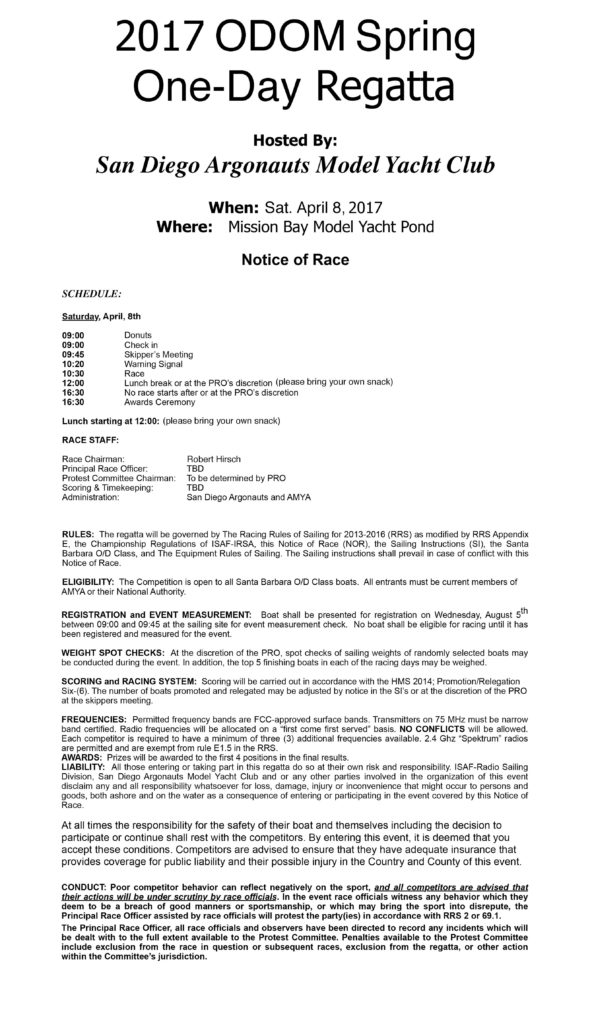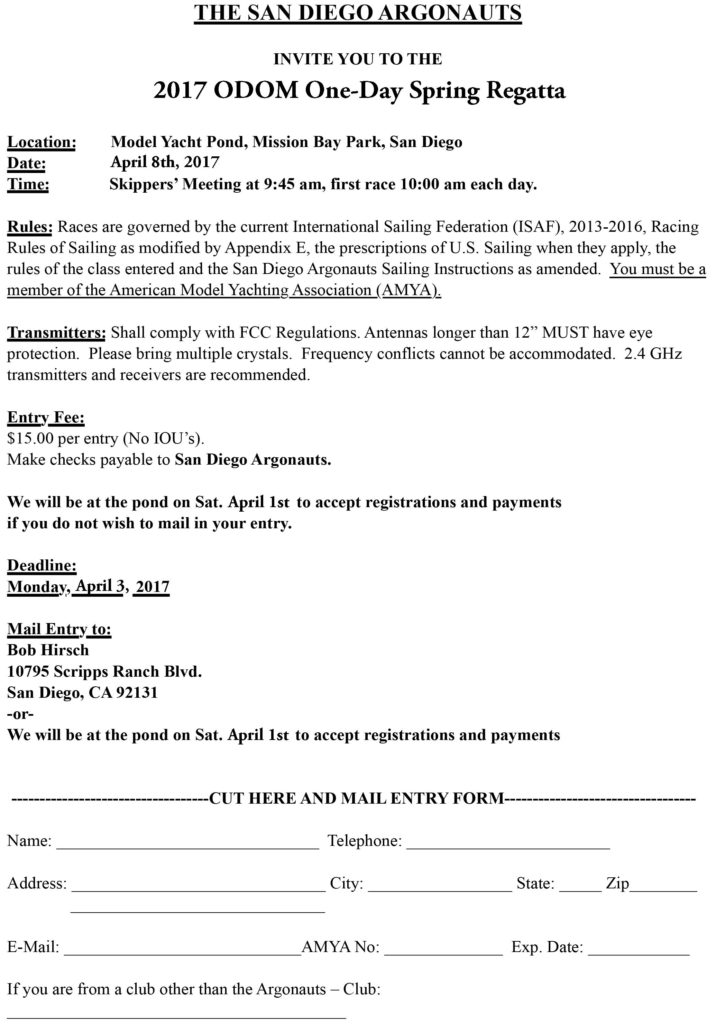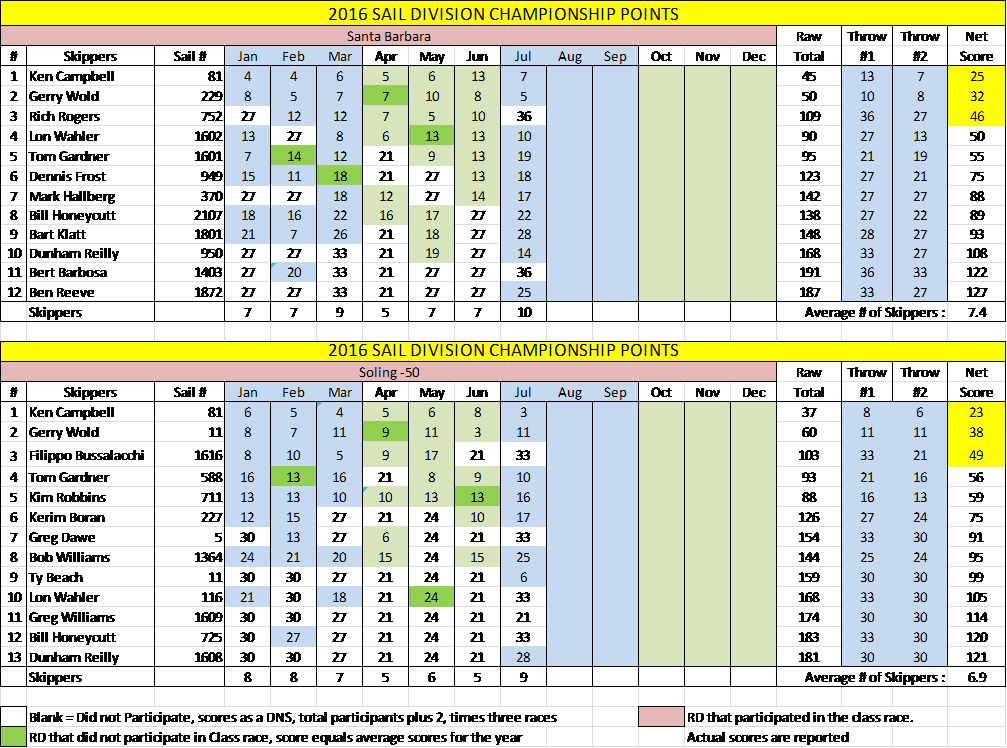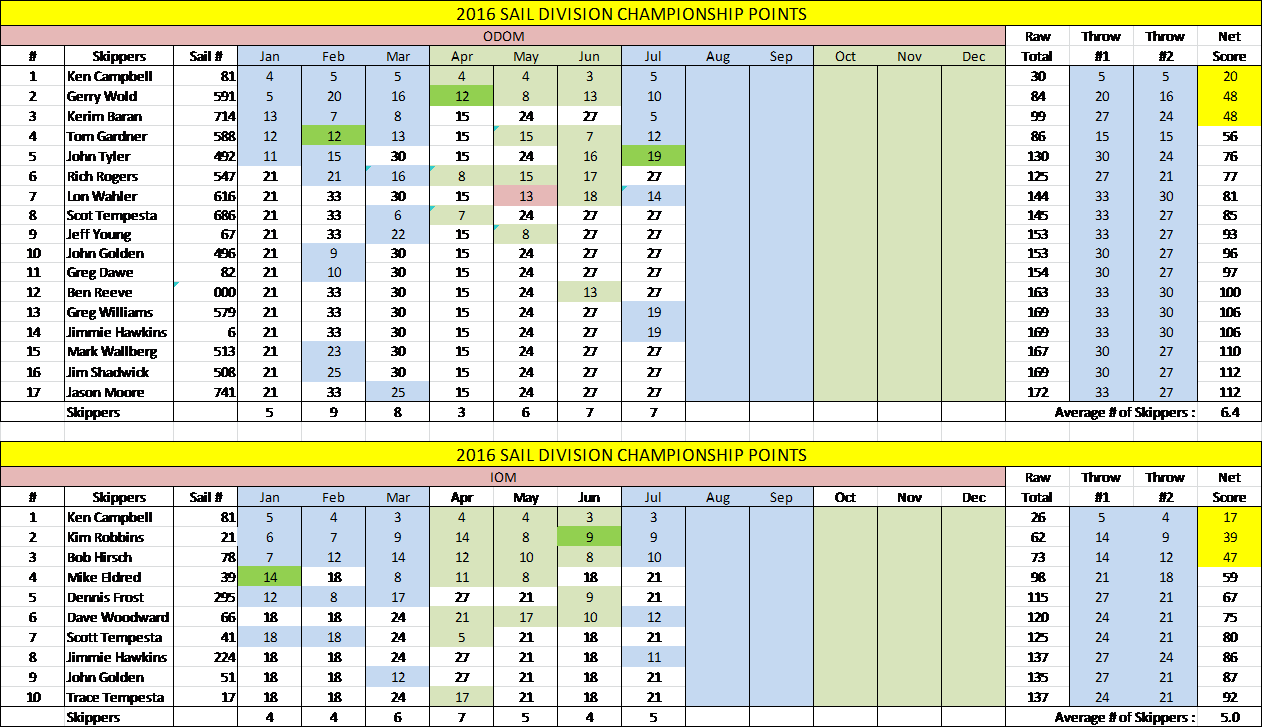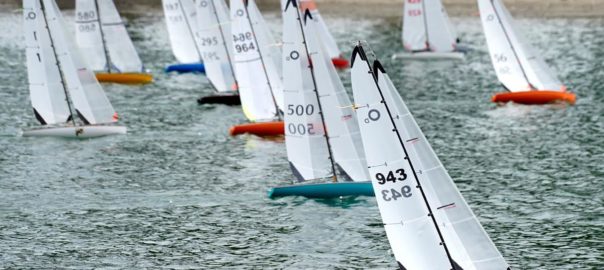
Category Archives: Sail

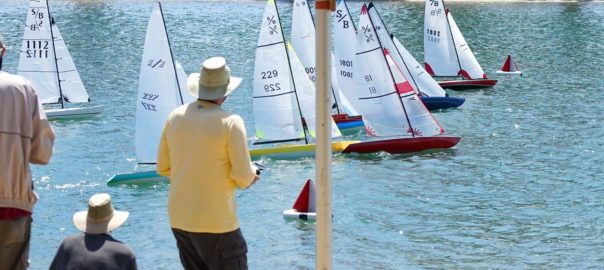
2017 Santa Barbara Spring Regatta
THE SAN DIEGO ARGONAUTS
INVITE YOU TO THE
2017 Santa Barbara Spring Regatta
FOR SANTA BARBARA ONE DESIGN – March 18, 2017
- Location: Model Yacht Pond, Mission Bay Park, San Diego
- Date: March 18, 2017.
- Time: Skippers’ Meeting at 9:45 am, first race 10:00 am each day.
- Rules: Races are governed by the current International Sailing Federation (ISAF), 2013-2016, Racing Rules of Sailing as modified by Appendix E, the prescriptions of U.S. Sailing when they apply, the rules of the class entered and the San Diego Argonauts Sailing Instructions as amended. You must be a member of the American Model Yachting Association (AMYA).
- Transmitters: Shall comply with FCC Regulations. Antennas longer than 12” MUST have eye protection. Please bring multiple crystals. Frequency conflicts cannot be accommodated. 2.4 GHz transmitters and receivers are recommended.
- Entry Fee:
$15.00 per entry (No IOU’s).
Make checks payable to San Diego Argonauts.
We will be at the pond on Sat. March 11 to accept registrations and payments
if you do not wish to mail in your entry. - Deadline: Monday, March 13, 2017
- Mail Entry to:
Bob Hirsch
10795 Scripps Ranch Blvd.
San Diego, CA 92131
-or-
We will be at the pond on Sat. March 11 to accept registrations and payments - Forms:
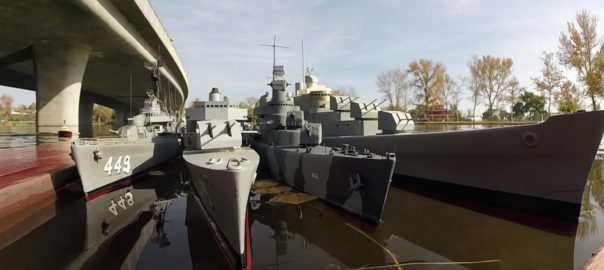
2016 Pearl Harbor Memorial Run
On December 10, 2016 the Task Force 96 / The 8th Fleet and members of the San Diego Argonauts Scale Boat Division held it’s run of 1:96 scale RC model ships in memory of the attack on Pearl Harbor.
Click here for the long version of this video:
https://youtu.be/IMiB-YIvR10
Check out Task Force 96 on Facebook:
https://www.facebook.com/groups/191168340623/
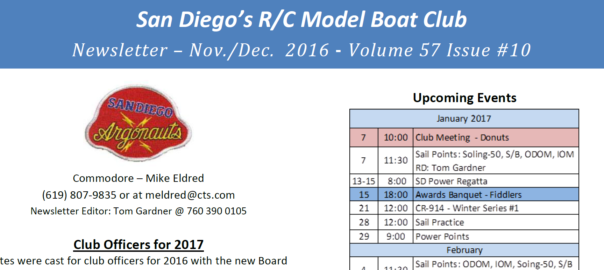
November / December 2016 San Diego Argonauts Newsletter
NEWSLETTER: Newsletter – November / December 2016 – Volume 57 Issue #10
ARCHIVE: Past Newsletters
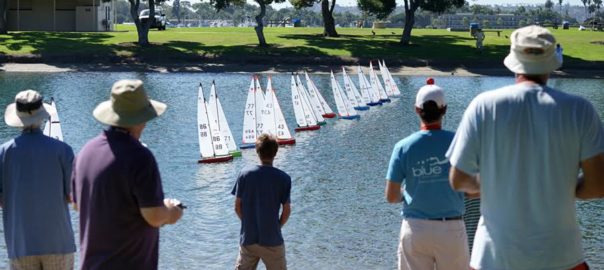
2017 IOM Mid-Winter Regatta
Hosted By: the San Diego Argonauts Model Yacht Club
When: Feb. 11th & 12th (Marblehead “Run What Ya Brung” on Feb. 10th)
Where: the Mission Bay Model Yacht Pond, San Diego, CA
Notice of Race: You are cordially invited to participate in the 2017 IOM Mid-Winter Regatta
FORMAT: Fleet Racing utilizing HMS 2016 for scoring and fleet management
SCHEDULE:
02/10/17: Friday / Marbleheads
08:30…….Check-in, Event Measurement, Class & AMYA Certification Check (for IOM’s)
10:30…….Skipper’s Meeting
10:50…….Warning Signal
11:00…….Race (Marbleheads only)
17:00…….No race start after or at the PRO’s discretion.
19:30…….Social Event Non-host dinner @ Fiddler’s Green Restaurant, 2760 Shelter Island Drive, San Diego CA 92106 (619) 222-2216
02/11/17: Saturday / IOM
08:30. . . . . .Check-in
09:30. . . . . .Open Practice
10:30. . . . . .Skipper’s Meeting
10:50…….Warning Signal
11:00…….Race
17:00…….No race start after or at the PRO’s discretion.
17:00…….Phil’s BBQ
02/12/17: Sunday
09:30…….Open Practice
09:50…….Warning Signal
10:00…….Race
16:00…….No race start after or at the PRO’s discretion.
16:30…….Awards Ceremony
Lunch starting at 12:30 Depending on progress of racing there may not be a formal lunch break.
Skippers will have time to have lunch in between heats.
RACE STAFF:
Race Chairman: Robert Hirsch USA
Principal Race Officer: Fred Rocha USA
Protest Committee: TBD
Official Measurer: Mike Eldred USA
Scoring & Timekeeping: Fred Rocha USA
Administration: San Diego Argonauts
RULES: The regatta will be governed by RRS 2017-2020, this Notice of Race (NOR), the Sailing Instructions (SI) the International One Metre Class, HMS 2016 and The Equipment Rules of Sailing. The Sailing instructions shall prevail in case of conflict with this Notice of Race.
ELIGIBILITY: The Competition is open to all IOM class boats. All entrants must be current members of AMYA or their National Authority and have a valid IOM measurement certificate.
REGISTRATION and EVENT MEASUREMENT: Boats with a valid measurement certificate shall be presented for registration on Friday/Saturday, Feb. 10th/11th between 8:30 and 10:00 at the sailing site for event measurement. No boat shall be eligible for racing until it has been registered and measured for the event.
WEIGHT SPOT CHECKS: At the discretion of the Race Director, spot checks of sailing weights of randomly selected boats may be conducted during the event. In addition, the top 5 finishing boats in each of the racing days may be weighed.
SCORING and RACING SYSTEM: Scoring will be carried out in accordance with the HMS 2016. Promotion/Relegation Six-(6). The number of boats promoted and relegated may be adjusted by notice in the SI’s or at the discretion of the Race Director at the skippers meeting.
PRE-REGISTRATION and FEES: Please this is a must, in order to assure no Radio Channel conflict early on, this really help speeds things up on race days. Also allows us to have adequate amount of food and drinks. Entries are to be made using the official entry form below and forwarded to:
Robert Hirsch
10795 Scripps Ranch Blvd.
San Diego, CA 92131
858.663.5702
rhirsch01@gmail.com
Entry fee is USD$50.00per boat and includes lunch and beverages for the 2 days and Phil’s BBQ (Sat. end of day). Fees are payable by check to San Diego Argonauts mailed to the above address or on line (I will provide a PayPal registration link once the AMYA has it set up).
FREQUENCIES: Permitted frequency bands are FCC-approved surface bands. Transmitters on 75 MHz must be narrow band certified. Radio frequencies will be allocated on a “first come first served” basis. NO CONFLICTS will be allowed. Each competitor is required to have a minimum of three (3) additional frequencies available. 2.4 Ghz radios are permitted and are exempt from rule E2.4 in the RRS.
AWARDS: Prizes will be awarded to the first 5 positions in the final results.
LIABILITY: All those entering or taking part in this regatta do so at their own risk and responsibility. ISAF- IRSA, IOM ICA, AMYA, USA NCA, San Diego Argonauts Model Yacht Club and or any other parties involved in the organization of this event disclaim any and all responsibility whatsoever for loss, damage, injury or inconvenience that might occur to persons and goods, both ashore and on the water as a consequence of entering or participating in the event covered by this Notice of Race.
At all times the responsibility for the safety of their boat and themselves including the decision to participate or continue shall rest with the competitors. By entering this event, it is deemed that you accept these conditions. Competitors are advised to ensure that they have adequate insurance that provides coverage for public liability and their possible injury in the Country and County of this event.
ENTRY DEADLINE: Entries must be received no later than Sun. Feb. 5th, 2017. Late entries may be accepted on site only at the discretion of the Race Chairman. Any late entry will be responsible for entering with an unassigned frequency. Late entry shall be paid in cash. There is no refund.
2017 IOM Mid-Winter Regatta ENTRY FORM
LIABILITY: All those entering or taking part in this Regatta do so at their own risk and responsibility. ISAF-IRSA, IOM ICA, AMYA, USA NCA, San Diego Argonauts Model Yacht Club, regatta staff, and or any other parties involved in the organization of this event disclaim any and all responsibility whatsoever for loss, damage, injury or inconvenience that might occur to persons and goods, both ashore and on the water as a consequence of entering or participating in the event covered by this Notice of Race.
At all times the responsibility for the safety of their boat and themselves including the decision to participate or continue shall rest with the competitors. By entering this event, it is deemed that you accept these conditions. Competitors are advised to ensure that they have adequate insurance that provides coverage for public liability and their possible injury in the Country and County of this event.
CONDUCT: Poor competitor behavior can reflect negatively on the sport, and all competitors are advised that their actions will be under scrutiny by race officials. In the event race officials witness any behavior which they deem to be a breach of good manners or sportsmanship, or which may bring the sport into disrepute, the Principal Race Officer assisted by race officials will protest the party (ies) in accordance with RRS 2 or 69.1.
The PRO, all race officials and observers have been directed to record any incidents which will be dealt with to the full extent available to the Protest Committee. Penalties available to the Protest Committee include exclusion from the race in question or subsequent races, exclusion from the regatta, or other action within the Committee’s jurisdiction.
FEE: USD$50. 00 per boat.
Make check payable to: San Diego Argonauts]
For online/PayPal registration: https://form.jotform.com/63554183318963
ENTRY DEADLINE: Feb. 5th, 2017
If you are mailing a check, please Send to:
Robert Hirsch
10795 Scripps Ranch Blvd.
San Diego, CA. 92131
858.663.5702
email: rhirsch01@gmail.com
——————————————————————————————–
Name:
AMYA #:
Address:
City:
State:
Zip:
Phone:
Email Address:
Sail #:
Country:
Hull #:
Hull Design:
Hull Color:
Channel: Primary Secondary Alternate
Emergency phone #:
Emergency contact name:
By signing this entry form I agree to all the terms and conditions set forth in the Notice of Race above.
Signature:
Date:
Mail or EMAIL this form with copies of AMYA Card, Boat Certificate and Fee
For online/PayPal registration… look here for the link as soon as the AMYA has it set-up
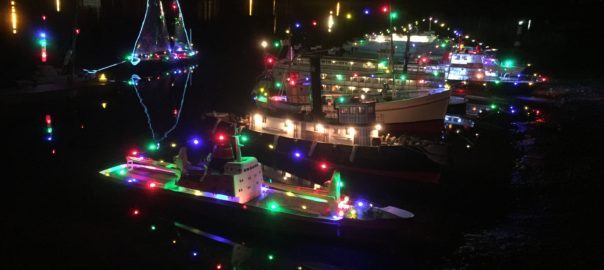
2016 Model Boat Parade of Lights
Come see the San Diego Argonauts’ lighted remote controlled model boats! We’ll be kicking off the Christmas season with our own Model Boat Parade of Lights around the San Diego Model Boat Pond. Public is welcome. Bring a chair. Enjoy the lights.
If you have a scale model boat, start working on your lights. Be sure to bring a warm sweater, a hot beverage, and a great camera. This is going to be another beautiful event!
Our past Model Boat Parade of Lights were each an incredible success. This year, the San Diego Argonauts will be hosting another mini Parade of Lights at the San Diego Model Boat Pond on
- Date: Wednesday, December 14, 2016
- Time: 5:00pm – 7:00pm
- Location: San Diego Model Yacht Pond
- More info on Facebook
- Event Flyer
Ideas for easy RC model boat lights.
- LED Light Strings http://amzn.to/2f0vI0n
-
EL Wire (electroluminescent wire) http://amzn.to/2gezGjN
In case you’re new to the mini Parade of Lights, here’s a video from January 2015:
(Edit December 22, 2016)
On December 14, we had 20+ boats in the water and about 100 spectators! What an awesome event. Thanks David Manley for putting together this video filmed from the bow of his RC scale model yacht.
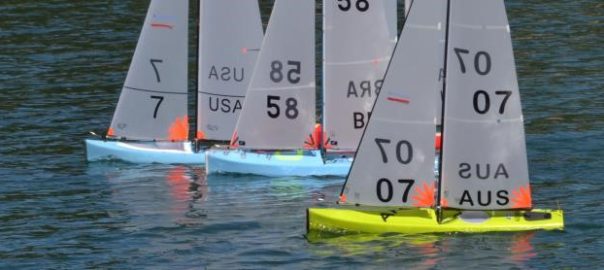
2016 IOM National Championship
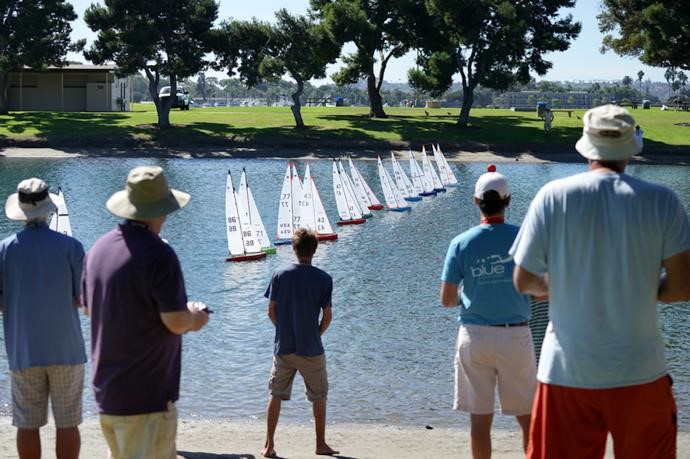
2016 IOM National Championship (October 7-9, 2016)
Mission Bay Model Yacht Pond in San Diego, CA
By Bob Wells
Initially slated for Boise; the venue moved to San Diego where more participation was assured at this bucket list venue that is a more convenient travel destination. And San Diego came through again with 80-degree sunny weather for our 2016 Nationals on the venerable Model Yacht Pond custom built by Parks in the middle of Mission Bay. It could not be more convenient for radio sailors and the pond aligns so well with the dependable onshore breeze. Plus, the host San Diego Argonauts pride themselves on running a first class full service regatta, which this time featured individual custom sandwiches, lots of giveaways, and an excellent catered barbeque Saturday at the venue after racing. This time a club newbie, Bob Hirsch, stepped up as organizer to handle registrations and the many details. The tell of a good organizer is it all works seamlessly with no sign of panic, so good job Bob. PRO Freddie Rocha entertained and cajoled as only he does between races, and his professional race management is a huge contribution to the class. Let’s just say Freddie doesn’t need artificial amplification to be heard. Assisting on the scoring and heat boards was the highly competent Elaine Brown, imported from Oz for race management for this event.
Thursday practice was so much fun visiting and checking out the new kit. I’ve seen the pictures, but this was my first time with Zvonko’s proto Kantun 2 and Tim Brown’s AKA proto, and clearly they are heading in a similar “wider and shallower with mast a little aft” direction. What a treat to talk with the designers about their protos, and both have just started production. George Pedrick has habitually been an early purchaser of Ian Vickers’ designs recently, and on cue he provided my first view of the new V10. His wife Gene now sails his V9, so we got to see them side by side. I can see the subtle differences when George points them out, but it seems more like a V9.3 to me. Safe to say IOM design development is not stagnant in 2016. The overall quality of all the boats and the preparation of them is high too. Well the exception is maybe Toshi’s Micro Brew 5, where the hull is ultra-smooth but too many sanding sessions left the soft paint he prefers thin to non-existent. Not the usual Toshi standard, and his no apology excuse is that his shop time is all directed to his new MB6.
The NoR set aside Friday morning for compliance check, which per usual was headed by Commodore Mike Eldred with IOM Class Secretary Bruce Andersen again assisting him. It is amazing how quickly they could weigh all our batteries, our keels, weigh our boats all-up ready to sail, and float test them. Only 1-rigs were weighed, because you don’t need a 2-rig here. It helps that we mostly all know the drill. All “eventually” passed and we were ready to sail on time, but the wind took a little longer to develop. Unfortunately, some registered skippers did not compete. To name a few: Organizer Bob Hirsch felt pressured to be available for handling the little demands that kept happening, and Bahamian Stan Wallace had Hurricane Mathew to deal with (he’s fine).
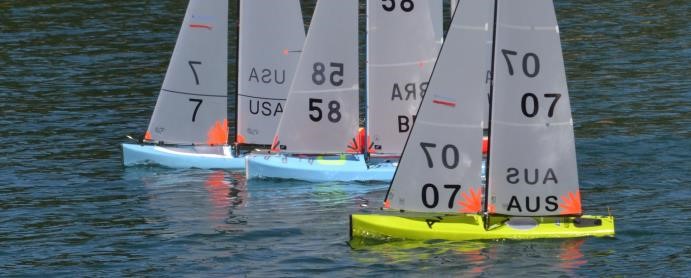
Racing was great, but you have to accept shifty conditions that, “no matter where you are on the course, somebody has better wind than you” (thanks for that John Ebey). The prevailing onshore wind is straight down the narrow-ish rectangular pond with many NW and SW shifts and holes. The skippers job is simple to define; find the shifts and pressure, and to transition efficiently as the wind varies. Not so simple in execution. Mackey says, “This is one of the most difficult venues to sail well at”. Friday I thought it best to hug the south shore most of the time for big gains from that narrow band of better pressure with upwind lifts and downwind headers. Saturday and Sunday, the wind was more square and you used the whole course, but always you searched for shifts and/or pressure. The experienced guys that know this venue have an early advantage, which diminishes as the regatta moves on. Nobody gets it right all the time, and in every leg positions change until you cross the line. And damn those fickle shifts and lulls just before the finish line and weather mark that so affect your outcome! I very much like the challenge of sailing here.
No surprise it was a strong field augmented by skippers from BRA, CRO, and Oz. Everybody but our winner spent some time in B fleet, and some top skippers found themselves fighting to get out of C. Congratulations to our winner, 2009 World Champion Zvonko Jelacic from CRO, who separated himself from the leaders on the last day. From past performance Zvonko was the easy pick for this one, but after two days he was in 2nd just behind John Ebey, who was sailing exceptionally well. USA guys Gary Boell, Craig Mackey, Mark Golison, and Bobby Flack were also all still in the hunt after day 2. The last day Zvonko maintained his consistency to pull away from the pack for the win. Golison made his move with all firsts and 2nds on the last four races and Mackey nearly matched him on those races. They finished tied with Golison getting 2nd on countback. Ebey and his beautifully prepared Fusion finished a few points out for a close 4th. It was nice for a change to see a young guy, Bobby Flack, in top five.
As it should be, those racing quietly focused on the business at hand and spoke only to make a needed hail, then as soon as the race is over the friendly banter resumes. This is the environment I like to race in, absent the distraction of sea lawyers arguing about rule violations in the control area. Sure we missed some sailing time for a couple of protests, but this was a cleanly sailed regatta. Some of the credit for this goes to the observer system the USA class instituted about five years ago, thanks Freddie. All who participated were winners on this great weekend, and it was smiles all around as we packed to depart.
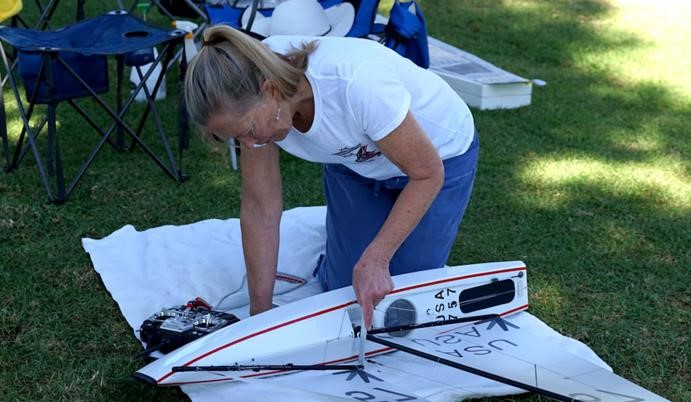
Of course a big IOM event is also very social. Under the shade of the oak trees the pond is a great place to hang out and meet old friends and make new ones. My old friends now include Zvonko and Tim and Elaine Brown from overseas. One of my new friends is Michel Roure from New Jersey, where he sails every Saturday he can at Central Park MYC. He also hopes to form a new sailing club at my Parsippany Lake, NJ. Born in France, he purchased a Brazilian Britpop and picked it up in Foster City last year after Brazil’s Pedro Stier chartered it for Worlds. A nice way to get a new boat that is properly tuned. Worlds is where the very French Michel was hooked by the friendly atmosphere of our international community. Now Michel has purchased another Britpop from Denis Astbury for his Father’s 86th birthday. Sadly, Pedro passed unexpectedly this year, and Michel carries the name Pedro gave the boat, Alforria, in his honor.
Every time I sail here there is always a contingent of Argonaut club members watching and cheering when their boys do well. Friends and significant others are hanging out too, or seeing the sights and shopping. After three IOM regatta visits to San Diego, I don’t think my wife has seen a single heat yet. She does see a lot of San Diego though so we’re both happy. What a great weekend and what a great class. We left with a strong desire to return soon and stay longer. 2017 Midwinters maybe?
Summary of the 2016 IOM National Championship:
- Class: IOM
- Date: October 7-9, 2016 (3 days racing)
- Location: Mission Bay Model Yacht Pond in San Diego, CA
- Host Club: San Diego Argonauts Model Yacht Club
- Entries: 39
- Winds: light – upper middle of 1-rig
- Races Completed: 15 (three heats per race).
- Scoring System: 2014 HMS
- Regatta Committee & Valuable Assistants: Organizer & Registration – Bob Hirsh; PRO, Buoy Boat & Scorekeeper – Fred Rocha; Race Officer: Elaine Brown (AUS); Measurements – Mike Eldred, Bruce Andersen; Food – Mark Halberg; Volunteers – Bob Williams and Rich Rogers.
Special Awards:
- Corinthian Sailor Award – David Woodward
- Best IOM New Sailor – Gabriel Mueller
- Thank You! Award – Elaine Brown
Photos Links:
- http://s181.photobucket.com/user/pamologist/library/2016%20NCR%20San%20Diego%20Argonauts?sort=3&page=1
- https://www.dropbox.com/sh/6ourfqkq7yyzw2q/AACM5rf0nWV3s62lzONAxlWda?dl=0
- http://www.ibextrax.com/RC2016/1007USN/
- Video Link: http://www.rcgroups.com/forums/showthread.php?t=2697607&page=5
- Full Results: http://www.ibextrax.com/RC2016/Results/1007USN.pdf
2016 IOM National Championship – Results after 15 races with 2 throw-outs:
| Position | Skipper | Sail # | City | Hull | Score |
| 1 | Zvonko Jelacic | 35 | Split, CRO | Kantun 2 Proto | 34.0 |
| 2 | Mark Golison | 55 | California, USA | V9 | 59.0 |
| 3 | Craig Mackey | 29 | California, USA | britPOP! | 59.0 |
| 4 | John Ebey | 93 | California, USA | FUSION | 62.0 |
| 5 | Bobby Flack | 96 | Michigan, USA | britPOP! | 71.0 |
| 6 | Gary Boell | 71 | California, USA | NITRO | 96.0 |
| 7 | George Pedrick | 50 | California, USA | V10 | 101.0 |
| 8 | Kelly Martin | 77 | Washington, USA | V8 | 111.3 |
| 9 | Ken Campbell | 181 | California, USA | V8 | 114.5 |
| 10 | Jerry Brower | 42 | Washington, USA | V9 | 116.0 |
| 11 | Steve Toschi | 94 | California, USA | Micro Brew 5 | 124.0 |
| 12 | Gabriel Mueller | 58 | Rio Grande do Sul, BRA | britPOP! | 137.0 |
| 13 | Pedro Loureiro | 88 | Rio Grande do Sul, BRA | britPOP! | 142.0 |
| 14 | Baron Bremer | 81 | Florida, USA | britPOP! | 144.0 |
| 15 | Chris Sullivan | 62 | California, USA | britPOP! | 149.0 |
| 16 | Jon Elmaleh | 2 | New York, USA | New Road 2 | 172.0 |
| 17 | Tim Brown | 07 | Gold Coast, AUS | AKA | 181.0 |
| 18 | Bob Wells | 7 | Washington, USA | Kantun S | 192.0 |
| 19 | Stephan Cohen | 28 | California, USA | britPOP! | 196.0 |
| 20 | Denis Rogers | 43 | California, USA | britPOP! | 218.0 |
| 21 | Bruce Andersen | 16 | Idaho, USA | britPOP! | 258.0 |
| 22 | Scott McConnell | 21 | Washington, USA | Kantun S | 259.0 |
| 23 | Michel Roure | 18 | New Jersey, USA | britPOP! | 263.0 |
| 24 | Joe Damico | 86 | Washington, USA | britPOP! | 271.0 |
| 25 | Larry Stiles | 64 | Washington, USA | britPOP! | 277.0 |
| 26 | Barry Donaher | 47 | Utah, USA | FUSION | 293.0 |
| 27 | Terrance Heyns | 13 | California, USA | Pikanto | 318.0 |
| 28 | Gene Harris | 57 | California, USA | V9 | 321.0 |
| 29 | David Jensen | 68 | Washington, USA | V9 | 334.0 |
| 30 | Mike Eldred | 39 | California, USA | V8 | 339.0 |
| 31 | Jim McCaa | 36 | Washington, USA | Kantun S | 347.0 |
| 32 | Glen Murray | 59 | California, USA | MB5 (Woody) | 348.0 |
| 33 | Steve Washburn | 155 | California, USA | V8 | 354.0 |
| 34 | Kurt Wells | 737 | California, USA | britPOP! | 396.0 |
| 35 | David Woodward | 54 | California, USA | Goth | 397.0 |
| 36 | Ben Reeve | 136 | California, USA | Tempest | 413.0 |
| 37 | Thomas Respess | 90 | California, USA | Micro Brew 4 | 427.0 |
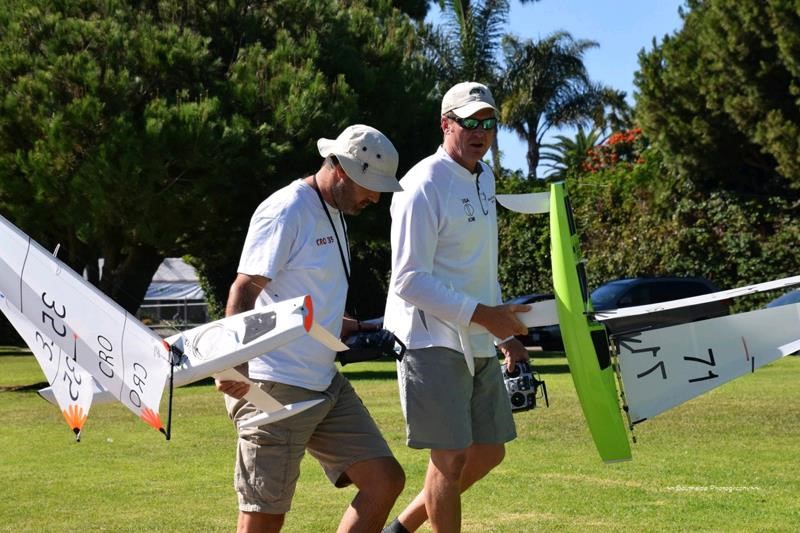
The ‘Bob Wells’ Rule: It is never good when they revise the Sis with a rule named after you… On the first day everybody wanted to sail along the south (or far shore) for the big gains, but my tired eyes were making it very difficult even though the distance wasn’t far. In the upwind congestion I was afraid I would hit someone and downwind I struggled with trim and steering – all due to my vision limitations. Maybe it was the afternoon glare and/or the boats were in shade there, but I was sailing embarrassingly poorly with no confidence.
Then I see Boells go to the south shore to release his grounded boat, and I recognize that I would see much better from that shore. After confirming that was in the control area, I sailed from the far shore my next races and I could see perfectly! What a joy. I could hear the starting tape (barely) and the few hails that went my way, and for the first time I’m sailing at the front of the fleet in a B and then in an A heat. Take away my other issues on those races with my topping lift snagging on my new carbon spreaders, and I would have had my best finishes of the regatta. Next Jerry Brower joined me for the A heat and he much preferred it too – he was in 2nd until a pile-up at the leeward mark left him DFL. For the record, Jerry said afterwards it was caused by the limited visibility from the skippers on the north shore, and if they shared his closer vantage point it would have been a clean rounding for all.
Racing ended for the day and the race committee quietly informed me there would be no more sailing from the south shore, and the official announcement came at the next day’s skipper’s meeting. Initially the concern was ‘unfair advantage’, but after I explained anybody could be there it was agreed that
wasn’t a problem. The official reason to restrict access to the south shore is ‘a communication problem’. So be it.
The next two days’ fewer boats sail along the south shore and my vision was acceptable upwind. Downwind I still struggled with trim and steering at the often preferred south shore though, and I’d say I lost 3-4 boats per leg simple due to vision limitations. After the regatta Zvonko volunteered he noticed my struggles with vision downwind, where too often my sails weren’t powered up or my steering direction was crap. He also gave me a tip: position myself either in front or behind my boat so I can see more of the sails. That should help…
The reason I’m spending so much time on this is I would like the San Diego Argonauts to consider putting the south shore back into the control area. Try it, the radio sailing quality will be better in my not so humble opinion. And you’ll get a nice workout from all the walking to the north side to visit and check the heat board. I can work off the nice lunches you provide.
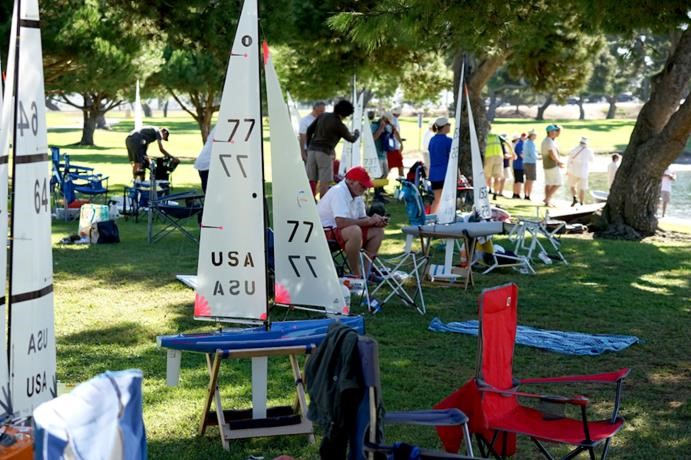
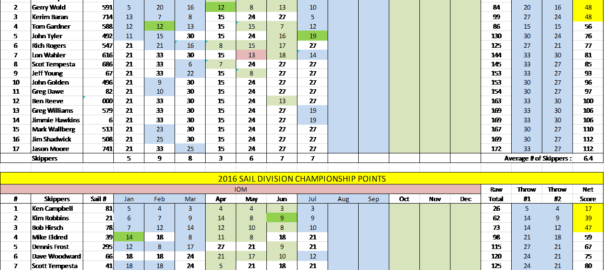
2016 Sail Division Championship Points
Racing Rules Review for Sailing Division
Ken Campbell put together a video covering a number of rules situations from our February Sail Points. These cover several port and starboard situations occur when racing RC sail boats.
